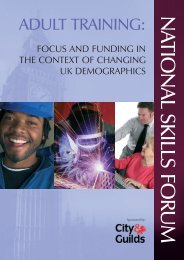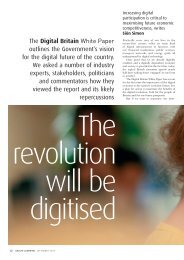Citizenship materials for ESOL learners in Wales - Niace
Citizenship materials for ESOL learners in Wales - Niace
Citizenship materials for ESOL learners in Wales - Niace
You also want an ePaper? Increase the reach of your titles
YUMPU automatically turns print PDFs into web optimized ePapers that Google loves.
11<br />
Community engagement<br />
The proposed syllabus is a ‘menu’ <strong>for</strong> <strong>ESOL</strong> <strong>learners</strong> work<strong>in</strong>g towards Entry 1, 2 or 3. It is not exhaustive.<br />
Below is a suggested list of topics which could be studied under this section.<br />
The items <strong>in</strong> bold are those which have teachers’ notes and <strong>learners</strong>’ activities associated.<br />
■ PTAs<br />
■ Help<strong>in</strong>g <strong>in</strong> your child’s school<br />
■ Other opportunities <strong>for</strong> voluntary work<br />
■ Mentor<strong>in</strong>g<br />
■ Police committees<br />
■ Work<strong>in</strong>g <strong>for</strong> charities<br />
■ Faith communities/multi-faith councils<br />
■ Record<strong>in</strong>g voluntary work as part of your CV<br />
11<br />
■ National fund-rais<strong>in</strong>g events<br />
■ Leisure<br />
■ Environment<br />
271
11<br />
Sources of the material used <strong>in</strong> this section<br />
■ www.do-it.org.uk<br />
■ www.comicrelief.com<br />
Community engagement<br />
TEACHERS’ NOTES<br />
■ A mock-up of a poster made with clip art pictures.<br />
Sources of other useful material<br />
■ Leaflets from a local volunteer bureau.<br />
■ Skills <strong>for</strong> Life learner <strong>materials</strong> pack, <strong>ESOL</strong> E3, unit 7: ‘Local communities’.<br />
273
<strong>Citizenship</strong> <strong>materials</strong> <strong>for</strong> <strong>ESOL</strong> <strong>learners</strong> <strong>in</strong> <strong>Wales</strong><br />
TEACHERS’ NOTES<br />
Useful Websites<br />
Website Web address Description<br />
Community<br />
Do-it!<br />
Timebank<br />
www.do-it.org.uk<br />
www.timebank.org.uk<br />
www.timebank.org.uk/volunteer/volunteer<strong>in</strong>g_<br />
stories.php<br />
A huge database on volunteer<strong>in</strong>g opportunities<br />
throughout the UK and overseas, based on<br />
<strong>in</strong><strong>for</strong>mation from local volunteer bureaux. A<br />
chance to browse through local opportunities.<br />
A volunteer<strong>in</strong>g promotion site.<br />
In<strong>for</strong>mation on volunteers’ personal stories and<br />
experiences.<br />
Volunteer<strong>in</strong>g<br />
England<br />
www.volunteer<strong>in</strong>g.org.uk<br />
A volunteer development agency promot<strong>in</strong>g<br />
volunteer<strong>in</strong>g as a powerful tool <strong>for</strong> change.<br />
www.volunteer<strong>in</strong>g.org/uk/imagebank<br />
Excellent photos of different volunteer<strong>in</strong>g<br />
situations and activities.<br />
Environment<br />
Friends of the Earth<br />
www.foe.co.uk/campaigns/local_groups_and_<br />
campaigns<br />
Opportunities to work as a volunteer at local and<br />
national levels.<br />
Greenpeace<br />
Worldwide Fund <strong>for</strong><br />
Nature<br />
Human rights<br />
Amnesty<br />
International<br />
Oxfam<br />
Animal rights<br />
Institute <strong>for</strong><br />
Volunteer<strong>in</strong>g<br />
Research<br />
www.greenpeace.org/<strong>in</strong>ternational_en<br />
www.wwf-uk.org<br />
www.amnesty.org.uk/action/localgroups<br />
www.oxfam.org.uk/coolplanet<br />
www.ivr.org.uk<br />
www.ivr.org.uk/projects.htm#7<br />
Opportunities to work as a volunteer at local and<br />
national levels.<br />
Opportunities to work as a volunteer at local and<br />
national levels.<br />
Opportunities to work as a volunteer at local and<br />
national levels.<br />
Opportunities to work as a volunteer at local and<br />
national levels.<br />
Site aim<strong>in</strong>g to develop knowledge and<br />
understand<strong>in</strong>g of volunteer<strong>in</strong>g <strong>for</strong> practitioners<br />
and policy makers. Detailed summaries of<br />
research undertaken.<br />
RSPB<br />
RSPCA<br />
www.rspb.org.uk<br />
www.rspca.org.uk<br />
This organisation works to help secure safe<br />
environments <strong>for</strong> birds and wildlife.<br />
In<strong>for</strong>mation about animal care, pet care sheets,<br />
recipes, local and <strong>in</strong>ternational RSPCA organisations.<br />
274
Section 11: Community engagement<br />
Type of resource Onl<strong>in</strong>e or downloaded Level/adaptability<br />
Interest<strong>in</strong>g section ‘ask the site’ –<br />
www.thesite.org/community/askthesite<br />
Questions posed by young people are answered<br />
by tra<strong>in</strong>ed volunteers. Deals with issues such as<br />
welfare, houses, health, legal rights.<br />
In<strong>for</strong>mation about campaigns, frequently asked<br />
questions, celebrity quotes, and so on.<br />
Text on both the UK and overseas volunteer<strong>in</strong>g.<br />
www.yorkshirechampions.org.uk/stories.php<br />
has <strong>in</strong><strong>for</strong>mation and stories of volunteers <strong>in</strong><br />
Yorkshire.<br />
Articles, news and events on volunteer<strong>in</strong>g,<br />
mostly text.<br />
A–Z of images <strong>in</strong>clud<strong>in</strong>g children, health and<br />
social care, education and prisons. Must be<br />
paid <strong>for</strong>.<br />
Onl<strong>in</strong>e search eng<strong>in</strong>e to search <strong>for</strong> types of<br />
volunteer<strong>in</strong>g and local opportunities.<br />
Media centre > Quotations – celebrity quotes.<br />
There is the option to tell your own story<br />
onl<strong>in</strong>e.<br />
Ideas of what to volunteer <strong>for</strong>; names of<br />
charities <strong>in</strong> the UK and abroad, residential as<br />
well.<br />
View <strong>for</strong> free onl<strong>in</strong>e or send off <strong>for</strong> copies.<br />
With help, E1<br />
E1+<br />
High E1+<br />
High E1+<br />
E1+<br />
TEACHERS’ NOTES<br />
Text based <strong>in</strong> general – success stories has<br />
stories about the successes and experiences of<br />
local groups. Also basic contact details <strong>for</strong> each<br />
group.<br />
In<strong>for</strong>mation on volunteer<strong>in</strong>g and job searches,<br />
text quite advanced.<br />
In<strong>for</strong>mation on volunteer<strong>in</strong>g as an <strong>in</strong>dividual and<br />
jo<strong>in</strong><strong>in</strong>g a volunteer group.<br />
Onl<strong>in</strong>e search eng<strong>in</strong>e to f<strong>in</strong>d a local group via<br />
your postcode. Lots of onl<strong>in</strong>e resources.<br />
/photosvideos – photos and video clips of<br />
Greenpeace activists and their campaigns.<br />
In<strong>for</strong>mation on endangered species onl<strong>in</strong>e.<br />
E2+<br />
E2+<br />
Short chunks of<br />
text, high E1+<br />
In<strong>for</strong>mation on what you can do and how to<br />
help.<br />
/what_you_can_do/volunteer/<br />
Onl<strong>in</strong>e A–Z of local groups.<br />
Role plays and <strong>in</strong>teractive activities.<br />
Large text, quite<br />
simple, E1+<br />
Quite dense text,<br />
high E1+<br />
Highly text-based site. Not very student friendly.<br />
Onl<strong>in</strong>e journal, site works best if you<br />
download and adapt the text.<br />
E2+<br />
Text only.<br />
Text-based site. Vacancies <strong>for</strong> volunteer<strong>in</strong>g<br />
available.<br />
Lots of text on stories of animal cruelty.<br />
Needs to be downloaded.<br />
Possible to listen to bird song onl<strong>in</strong>e.<br />
Pictures and Webcams onl<strong>in</strong>e too.<br />
Text to download. ‘Playpen’ has onl<strong>in</strong>e<br />
activities directed at children but suitable <strong>for</strong><br />
some <strong>ESOL</strong> adult <strong>learners</strong>.<br />
Adaptation<br />
necessary, E3+<br />
E2+<br />
Low E2+<br />
All details were correct at time of publication<br />
275
<strong>Citizenship</strong> <strong>materials</strong> <strong>for</strong> <strong>ESOL</strong> <strong>learners</strong> <strong>in</strong> <strong>Wales</strong><br />
TEACHERS’ NOTES<br />
11.1<br />
Fund-rais<strong>in</strong>g <strong>for</strong> a school<br />
Entry 1 Entry 2 Entry 3<br />
Read <strong>in</strong><strong>for</strong>mation from a poster.<br />
(Rt/E1.1b)<br />
Make statements about ability.<br />
(Sc/E1.4a)<br />
Request items <strong>in</strong> a semi-<strong>for</strong>mal<br />
situation. (Sc/E1.2a)<br />
Skim and scan leaflets.<br />
(Rt/E2.1b)<br />
Produce a leaflet. (Wt/E2.1a)<br />
Plan a fund-rais<strong>in</strong>g event, agree<strong>in</strong>g<br />
on details. (Sd/E3.1f)<br />
Suggested procedure (Entry 1)<br />
■ Ask <strong>learners</strong> to talk about their own children<br />
and the schools they go to.<br />
■ Introduce the idea of a school need<strong>in</strong>g extra<br />
money and ask <strong>learners</strong> how they th<strong>in</strong>k extra<br />
money can be used. Introduce the idea of a<br />
school sale to raise extra money <strong>for</strong> a school.<br />
■ Show the poster, check vocabulary and ask<br />
comprehension questions.<br />
■ Give each learner a number of picture cards<br />
with items that could be sold, ask<strong>in</strong>g them to<br />
say ‘I can give…’, with reference to what is on<br />
their cards.<br />
■ Divide the <strong>learners</strong> <strong>in</strong>to four groups, with a<br />
‘stall’ each – books, toys, children’s clothes,<br />
kitchen th<strong>in</strong>gs – and ask them to collectively<br />
decide on a price <strong>for</strong> each item and write it on<br />
the card.<br />
■ Learners take it <strong>in</strong> turns to staff a stall while<br />
other <strong>learners</strong> circulate round the stalls and<br />
role play buy<strong>in</strong>g and sell<strong>in</strong>g. The aim is to be<br />
the first group to sell out of items.<br />
■ Show <strong>learners</strong> the picture of hand pa<strong>in</strong>t<strong>in</strong>g.<br />
Ask if they know it and if not, ask them to<br />
guess which culture it comes from.<br />
■ Ask <strong>learners</strong> to read the text and to do the<br />
true/false exercise.<br />
■ Ask them if there is anyth<strong>in</strong>g that they can do<br />
to raise money; encourage them to say what it<br />
is and to write it.<br />
Differentiation<br />
■ With beg<strong>in</strong>ner readers, use the simplified text<br />
and help them to read the most useful<br />
sentences.<br />
Language po<strong>in</strong>ts<br />
Integrate the follow<strong>in</strong>g specific language po<strong>in</strong>ts:<br />
■ use of ‘can’ to express ability;<br />
■ language of shopp<strong>in</strong>g, <strong>for</strong> example ‘Have you<br />
got…’, ‘Can I have…’<br />
Extension activities<br />
■ Plan a class party or out<strong>in</strong>g, with <strong>learners</strong><br />
say<strong>in</strong>g what they can br<strong>in</strong>g.<br />
■ Make a poster <strong>for</strong> a class fund-rais<strong>in</strong>g event,<br />
real or imag<strong>in</strong>ary.<br />
Additional <strong>materials</strong> needed<br />
■ Pictures taken from catalogues, show<strong>in</strong>g a<br />
wide range of books, toys, children’s clothes,<br />
kitchen th<strong>in</strong>gs.<br />
276
Section 11: Community engagement<br />
Fund-rais<strong>in</strong>g <strong>for</strong> a school 11.1<br />
FUND-RAISING DAY<br />
Lidget Green Primary School is organis<strong>in</strong>g a fund-rais<strong>in</strong>g day to raise money <strong>for</strong> the<br />
school. We plan to have toy sales, book sales and the sale of food brought <strong>in</strong> by parents<br />
<strong>for</strong> the day. If any parents are <strong>in</strong>terested <strong>in</strong> fund rais<strong>in</strong>g and be<strong>in</strong>g part of this event, please<br />
let us know.<br />
LEARNERS’ ACTIVITY<br />
Book sale<br />
Give books<br />
Toy sale<br />
Give toys<br />
Cake sale<br />
Br<strong>in</strong>g food to sell<br />
Any ideas<br />
Contact the school<br />
Please contact:<br />
Lidget Green Primary School<br />
Tel: 01274 506045<br />
Or speak to your child’s teacher<br />
277
<strong>Citizenship</strong> <strong>materials</strong> <strong>for</strong> <strong>ESOL</strong> <strong>learners</strong> <strong>in</strong> <strong>Wales</strong><br />
LEARNERS’ ACTIVITY<br />
11.1<br />
Simplified text<br />
My name is Shazia.<br />
I have a son.<br />
Fund-rais<strong>in</strong>g <strong>for</strong> a school<br />
My son is eight years old.<br />
He goes to school.<br />
It is a good school.<br />
I can pa<strong>in</strong>t.<br />
I pa<strong>in</strong>t hands.<br />
278
Section 11: Community engagement<br />
Fund-rais<strong>in</strong>g <strong>for</strong> a school 11.1<br />
Text and true/false exercise<br />
My name is Shazia. I live <strong>in</strong> Brad<strong>for</strong>d. I am married. I have a son. His name is Ahmad.<br />
Ahmad is eight years old. He goes to primary school. I like Ahmad’s school. It is a good<br />
school.<br />
I help the school. I am a Mehndi artist. I can pa<strong>in</strong>t beautiful Mehndi designs on hands.<br />
I pa<strong>in</strong>t the hands of other mothers. I have a stall at the fund-rais<strong>in</strong>g days. It br<strong>in</strong>gs extra<br />
money <strong>for</strong> the school.<br />
LEARNERS’ ACTIVITY<br />
Circle ‘true’ or ‘false’<br />
1) Her name is Shazia. True / False<br />
2) She has a son. True / False<br />
3) Her son is n<strong>in</strong>e years old. True / False<br />
4) Her son goes to nursery school. True / False<br />
5) She is a Mehndi artist. True / False<br />
6) She pa<strong>in</strong>ts people’s faces. True / False<br />
What can you do<br />
279
<strong>Citizenship</strong> <strong>materials</strong> <strong>for</strong> <strong>ESOL</strong> <strong>learners</strong> <strong>in</strong> <strong>Wales</strong><br />
TEACHERS’ NOTES<br />
11.2<br />
Choos<strong>in</strong>g volunteer activities<br />
Entry 1 Entry 2 Entry 3<br />
Talk about wants. (Sd/E1.1c) Talk about wishes. (Sd/E2.1c) Phone a volunteer bureau.<br />
Read<strong>in</strong>g and understand<strong>in</strong>g (Sd/E3.1b)<br />
<strong>in</strong><strong>for</strong>mation from a Website. Tak<strong>in</strong>g part <strong>in</strong> <strong>for</strong>mal <strong>in</strong>teraction.<br />
(Rt/E2.3a)<br />
(Sd/E2.1b)<br />
Suggested procedure (Entry 2)<br />
■ Introduce the idea of voluntary work and<br />
establish the fact that it means work<strong>in</strong>g <strong>for</strong> no<br />
money.<br />
■ Ask <strong>learners</strong> to th<strong>in</strong>k of reasons why people<br />
do this, then look at the statements and see if<br />
the ideas are the same as their own.<br />
■ Encourage <strong>learners</strong> to talk about whether they<br />
are <strong>in</strong>terested <strong>in</strong> volunteer<strong>in</strong>g and what their<br />
reasons would be.<br />
■ Ask the <strong>learners</strong> if they do any volunteer work,<br />
and what it is.<br />
■ Ask <strong>learners</strong> to read ‘What can you do as a<br />
volunteer’ and then look at the websites.<br />
■ Clarify unknown vocabulary, <strong>for</strong> example<br />
‘earthquake’.<br />
■ Ask <strong>learners</strong> to suggest what else a volunteer<br />
could do, <strong>in</strong> addition to the activities they have<br />
found.<br />
■ Ask <strong>learners</strong> to say what they would and<br />
wouldn’t like to do, and, if possible, to give<br />
reasons based on the language <strong>in</strong> the ‘Can<br />
you...” questions.<br />
Differentiation<br />
■ Stronger speakers can discuss a number of<br />
options, while others choose one they would<br />
like to do and talk about it briefly.<br />
■ Record the dialogue on tape and play it<br />
several times. Ask <strong>learners</strong> comprehension<br />
questions, then let them read the script.<br />
■ Practise key phrases orally.<br />
■ Ask <strong>learners</strong> to work <strong>in</strong> pairs, practis<strong>in</strong>g the<br />
dialogue.<br />
Differentiation<br />
■ Stronger <strong>learners</strong> can work together to write<br />
their own dialogue. They can also play the<br />
part of the volunteer organiser <strong>in</strong> a freer role<br />
play.<br />
Language po<strong>in</strong>ts<br />
Integrate the follow<strong>in</strong>g specific language po<strong>in</strong>ts:<br />
■ would and wouldn’t like to;<br />
■ giv<strong>in</strong>g reasons, us<strong>in</strong>g ‘because’.<br />
Extension activities<br />
■ Learners go to www.do-it.org.uk, enter their<br />
post code and look <strong>for</strong> volunteer<strong>in</strong>g<br />
opportunities <strong>in</strong> the local area.<br />
■ Read leaflets from a local volunteer bureau.<br />
Additional <strong>materials</strong> needed<br />
■ Leaflets from a local volunteer bureau.<br />
■ Access to Internet.<br />
280
Section 11: Community engagement<br />
Choos<strong>in</strong>g volunteer activities 11.2<br />
Statements<br />
… I like to help<br />
people<br />
… I need work<br />
experience<br />
LEARNERS’ ACTIVITY<br />
… I want to meet<br />
people<br />
… I want to<br />
practise my<br />
English<br />
…I can write it on<br />
my CV<br />
… I feel bored at<br />
home<br />
…I want to give<br />
someth<strong>in</strong>g to<br />
other people<br />
… It can help me<br />
get a job <strong>in</strong> the<br />
future<br />
281
<strong>Citizenship</strong> <strong>materials</strong> <strong>for</strong> <strong>ESOL</strong> <strong>learners</strong> <strong>in</strong> <strong>Wales</strong><br />
LEARNERS’ ACTIVITY<br />
11.2<br />
Choos<strong>in</strong>g volunteer activities<br />
What can you do as a volunteer<br />
Look at these Websites:<br />
■ www.yearofthevolunteer.org<br />
■ www.do-it.org.uk<br />
■ www.homeoffice.gov.uk/communities/volunteer<strong>in</strong>g<br />
■ www.mvonl<strong>in</strong>e.gov.uk<br />
Search the Websites <strong>for</strong> a page of frequently asked questions (FAQs).<br />
Can you:<br />
■ help <strong>in</strong> playgroups<br />
■ collect money <strong>for</strong> places with earthquakes or floods or fam<strong>in</strong>e<br />
■ visit an old person<br />
■ help victims of crime<br />
■ work <strong>for</strong> hospital radio<br />
■ plant trees <strong>in</strong> the <strong>in</strong>ner city<br />
■ take dogs <strong>for</strong> walks<br />
■ support women <strong>in</strong> ‘women’s aid’ centres<br />
282
Section 11: Community engagement<br />
Choos<strong>in</strong>g volunteer activities 11.2<br />
Tape script<br />
Hello. Can I help you<br />
Yes, I’m look<strong>in</strong>g <strong>for</strong> work as a volunteer.<br />
We have a lot of opportunities. What are you <strong>in</strong>terested <strong>in</strong><br />
LEARNERS’ ACTIVITY<br />
I’m not sure.<br />
What language do you speak<br />
I speak Arabic and Kurdish.<br />
Well, I th<strong>in</strong>k you can volunteer <strong>in</strong> the Kurdish community centre.<br />
Yes, I know. I already do that. But really, I want to meet people and speak English.<br />
Well, we are look<strong>in</strong>g <strong>for</strong> people to help disabled people. They are mostly English speakers.<br />
That sounds good. What can I do<br />
Are you free on Wednesdays<br />
Yes, I am.<br />
Every Wednesday, there is a trip somewhere <strong>for</strong> people <strong>in</strong> wheelchairs. They go to<br />
museums or to parks and other places. They need people to volunteer to go with them.<br />
It’s really <strong>in</strong>terest<strong>in</strong>g.<br />
That sounds perfect. I can help people and speak English, and go to <strong>in</strong>terest<strong>in</strong>g places.<br />
Yes, I would really like to do that.<br />
283
<strong>Citizenship</strong> <strong>materials</strong> <strong>for</strong> <strong>ESOL</strong> <strong>learners</strong> <strong>in</strong> <strong>Wales</strong><br />
TEACHERS’ NOTES<br />
11.3<br />
Becom<strong>in</strong>g a volunteer<br />
Entry 1 Entry 2 Entry 3<br />
n/a<br />
Scan <strong>for</strong> key facts <strong>in</strong> a text.<br />
(Rt/E2.1b)<br />
Take part <strong>in</strong> <strong>for</strong>mal <strong>in</strong>teraction.<br />
(Sd/E2.1b)<br />
Skim and scan texts. (Rt/E3.6a,<br />
Rt/E3.7a)<br />
Ask questions <strong>in</strong> a <strong>for</strong>mal<br />
<strong>in</strong>teraction. (Sc/E3.3b,<br />
Sd/E3.1b, Sd/E2.1b)<br />
DIscussion skills. (Sd/E3.1d)<br />
Suggested procedure (Entry 3)<br />
■ Set the scene by discuss<strong>in</strong>g the question of<br />
volunteer<strong>in</strong>g and the k<strong>in</strong>ds of areas <strong>in</strong> which<br />
people can volunteer.<br />
■ Ask <strong>learners</strong> to predict what k<strong>in</strong>d of work<br />
might be done by volunteers <strong>in</strong> the area of<br />
disability, then ask them to skim the extract on<br />
disability and f<strong>in</strong>d out if the ‘jobs’ mentioned<br />
were predicted.<br />
■ Ask them to answer the questions and<br />
discuss the answers.<br />
■ Elicit from the <strong>learners</strong> how many ‘jobs’ are<br />
mentioned, then list them. Ask <strong>learners</strong> to put<br />
the jobs <strong>in</strong> order of <strong>in</strong>terest <strong>for</strong> themselves and<br />
to expla<strong>in</strong> to each other <strong>in</strong> groups why they<br />
would, or wouldn’t, f<strong>in</strong>d these jobs <strong>in</strong>terest<strong>in</strong>g.<br />
■ Elicit from <strong>learners</strong> the questions that they<br />
would want to ask if enquir<strong>in</strong>g at the volunteer<br />
bureau. Elicit the questions they th<strong>in</strong>k the<br />
volunteer organiser will ask.<br />
■ Use either a leaflet from a local volunteer<br />
bureau or extracts from the Websites, and ask<br />
<strong>learners</strong> to prepare the questions they will ask<br />
or the <strong>in</strong><strong>for</strong>mation they will give about one of<br />
the jobs, tak<strong>in</strong>g care to ensure that there is an<br />
organiser and a prospective volunteer <strong>for</strong> each<br />
job.<br />
■ Ask <strong>learners</strong> to pair up with the appropriate<br />
partner and role play the telephone<br />
conversation.<br />
■ Write the term ‘Millennium Volunteers’ and ask<br />
<strong>learners</strong> to guess what it means.<br />
■ Ask them to read the text on p. 287 and<br />
check their predictions.<br />
■ Check comprehension orally.<br />
■ Ask <strong>learners</strong> to work <strong>in</strong> pairs to discuss the<br />
MV scheme and then to go on to the other<br />
discussion questions.<br />
Language po<strong>in</strong>ts<br />
Integrate the follow<strong>in</strong>g specific language po<strong>in</strong>ts:<br />
■ us<strong>in</strong>g appropriate register <strong>for</strong> a <strong>for</strong>mal enquiry;<br />
■ question <strong>for</strong>mation.<br />
Extension activities<br />
■ Ask <strong>learners</strong> to research another area <strong>for</strong><br />
volunteer<strong>in</strong>g on the Website, and give a short<br />
talk about it.<br />
■ Ask <strong>learners</strong> to make a poster, encourag<strong>in</strong>g<br />
people to volunteer to support organisations<br />
work<strong>in</strong>g with disabilities.<br />
■ Ask <strong>learners</strong> to write a letter, <strong>in</strong>troduc<strong>in</strong>g<br />
themselves to a voluntary organisation.<br />
Additional <strong>materials</strong> needed<br />
■ Leaflets from a local volunteer bureau.<br />
■ Access to Internet.<br />
Differentiation<br />
■ If any <strong>learners</strong> are not confident about<br />
speak<strong>in</strong>g, make sure they are <strong>in</strong> the role of the<br />
prospective volunteer.<br />
284
Section 11: Community engagement<br />
Becom<strong>in</strong>g a volunteer 11.3<br />
Read this extract and discuss volunteer<strong>in</strong>g:<br />
LEARNERS’ ACTIVITY<br />
Disability<br />
Volunteer<strong>in</strong>g opportunities <strong>in</strong> this category might be work<strong>in</strong>g face-to-face, <strong>for</strong> example as<br />
a befriender, or <strong>in</strong> more <strong>in</strong>direct support roles such as driv<strong>in</strong>g.<br />
Disability organisations will often also have a wide range of opportunities <strong>in</strong> areas such as<br />
market<strong>in</strong>g, fundrais<strong>in</strong>g and adm<strong>in</strong>. Volunteer<strong>in</strong>g <strong>in</strong> face-to-face roles can be good<br />
experience <strong>for</strong> gett<strong>in</strong>g paid employment, and is often required <strong>for</strong> acceptance on to social<br />
work courses.<br />
Disabled volunteers might be particularly <strong>in</strong>terested <strong>in</strong> campaign<strong>in</strong>g organisations work<strong>in</strong>g<br />
<strong>for</strong> greater rights <strong>for</strong> disabled people, and <strong>in</strong> gett<strong>in</strong>g <strong>in</strong>volved <strong>in</strong> the governance of<br />
organisations.<br />
1. What do you th<strong>in</strong>k a befriender does<br />
2. What k<strong>in</strong>d of th<strong>in</strong>gs do you th<strong>in</strong>k a fundraiser does<br />
3. What k<strong>in</strong>d of volunteer work should you do if you want to apply <strong>for</strong> a social work<br />
course<br />
4. What k<strong>in</strong>d of work does the article suggest <strong>for</strong> people who are disabled<br />
■ List all the volunteer ‘jobs’ conta<strong>in</strong>ed <strong>in</strong> the extract, and then put them <strong>in</strong> order of your<br />
<strong>in</strong>terest. Talk to someone else about which ‘jobs’ you would f<strong>in</strong>d most <strong>in</strong>terest<strong>in</strong>g and<br />
expla<strong>in</strong> why.<br />
285
<strong>Citizenship</strong> <strong>materials</strong> <strong>for</strong> <strong>ESOL</strong> <strong>learners</strong> <strong>in</strong> <strong>Wales</strong><br />
LEARNERS’ ACTIVITY<br />
11.3<br />
Becom<strong>in</strong>g a volunteer<br />
Role cards<br />
1<br />
You work <strong>in</strong> a volunteer bureau. You organise volunteers.<br />
What do you say when you answer the phone<br />
You have to give <strong>in</strong><strong>for</strong>mation to people who want to ………………………… (<strong>in</strong>sert a<br />
suitable volunteer post).<br />
What is the important <strong>in</strong><strong>for</strong>mation you will give them Look <strong>in</strong> the leaflet and try to<br />
remember the important po<strong>in</strong>ts.<br />
2<br />
You want to volunteer as a ………………………. (<strong>in</strong>sert a suitable volunteer post).<br />
You are go<strong>in</strong>g to telephone the volunteer bureau.<br />
What will you say first<br />
What <strong>in</strong><strong>for</strong>mation do you want What questions will you ask<br />
286
Section 11: Community engagement<br />
Becom<strong>in</strong>g a volunteer 11.3<br />
What do you th<strong>in</strong>k<br />
Read this extract on Millennium Volunteers and discuss volunteer<strong>in</strong>g:<br />
Millennium Volunteers<br />
Millennium Volunteers (MV) is a national programme aimed at young people aged 16–24.<br />
As an MV you volunteer your time to help others by do<strong>in</strong>g someth<strong>in</strong>g you enjoy. You get<br />
the chance to develop your skills and personal qualities and someth<strong>in</strong>g really worthwhile to<br />
add to your CV.<br />
LEARNERS’ ACTIVITY<br />
If you complete 100 hours of volunteer<strong>in</strong>g, you ga<strong>in</strong> an award signed by the M<strong>in</strong>ister <strong>for</strong><br />
Skills and Vocational Education. If you complete 200 hours, you get an Award of<br />
Excellence, signed by the Secretary of State <strong>for</strong> Education and Skills.<br />
Over 40,000 MVs have received an Award of Excellence so far!<br />
■ What are the advantages of volunteer<strong>in</strong>g <strong>for</strong> young people<br />
■ Are there any disadvantages<br />
■ Do you th<strong>in</strong>k the Millennium Volunteer scheme is a good idea<br />
■ Why do you th<strong>in</strong>k people choose to do voluntary work How many different reasons<br />
can you th<strong>in</strong>k of<br />
■ Do people do voluntary work <strong>in</strong> other countries If so, is the system the same as <strong>in</strong> the<br />
UK or different<br />
■ Would you like to do voluntary work<br />
■ Do you already have experience of voluntary work<br />
■ What k<strong>in</strong>d of activities are you <strong>in</strong>terested <strong>in</strong><br />
287
<strong>Citizenship</strong> <strong>materials</strong> <strong>for</strong> <strong>ESOL</strong> <strong>learners</strong> <strong>in</strong> <strong>Wales</strong><br />
TEACHERS’ NOTES<br />
11.4<br />
Comic Relief<br />
Entry 1 Entry 2 Entry 3<br />
n/a Read <strong>for</strong> specific <strong>in</strong><strong>for</strong>mation. Read <strong>for</strong> specific <strong>in</strong><strong>for</strong>mation.<br />
(Rt/E2.1b)<br />
(Rt/E3.7a)<br />
Ask <strong>for</strong> and listen to <strong>in</strong><strong>for</strong>mation.<br />
(Sc/E3.3b, Lr/E3.3b)<br />
Suggested procedure (Entry 3)<br />
■ Discuss with <strong>learners</strong> the mean<strong>in</strong>g of the word<br />
‘charity’ and the charities they are aware of.<br />
■ Elicit or give background <strong>in</strong><strong>for</strong>mation about<br />
Comic Relief.<br />
■ Divide the class <strong>in</strong>to four or eight smaller<br />
groups and give each group a different<br />
<strong>in</strong><strong>for</strong>mation sheet (sheet A, B, C or D). Give<br />
them a question sheet and ask them to work<br />
together to see how many questions they can<br />
answer by us<strong>in</strong>g their <strong>in</strong><strong>for</strong>mation sheet.<br />
■ Ask them to note the questions they could not<br />
answer from their own sheet and then to<br />
circulate and ask people from other groups<br />
these questions.<br />
■ Take feedback to check the answers to the<br />
questions.<br />
■ Ask <strong>for</strong> op<strong>in</strong>ions about the facts they have<br />
discovered.<br />
Differentiation<br />
■ Allow <strong>learners</strong> to work <strong>in</strong> mixed ability groups<br />
<strong>for</strong> this activity.<br />
Language po<strong>in</strong>ts<br />
Integrate the follow<strong>in</strong>g specific language po<strong>in</strong>ts:<br />
■ ask<strong>in</strong>g questions, <strong>in</strong>clud<strong>in</strong>g embedded<br />
questions;<br />
■ use of the passive <strong>in</strong> the read<strong>in</strong>g texts.<br />
Extension activities<br />
■ Watch videos of Red Nose Day events and<br />
use them <strong>for</strong> listen<strong>in</strong>g practice.<br />
■ Discuss the issue of charity and other ways<br />
that richer countries can help alleviate poverty.<br />
■ Read charities’ leaflets sent out by post.<br />
Additional <strong>materials</strong> needed<br />
■ Videos, visuals, realia connected with Comic<br />
Relief.<br />
288
Section 11: Community engagement<br />
Comic Relief 11.4<br />
What are the three ma<strong>in</strong> When will the next Comic When was Comic Relief<br />
th<strong>in</strong>gs that the organisation Relief day be held set up<br />
does<br />
Where has two-thirds of Whose idea was it to start How much money did<br />
Comic Relief’s money Comic Relief Comic Relief raise <strong>in</strong> 2001<br />
been spent Where has<br />
the other third gone<br />
LEARNERS’ ACTIVITY<br />
How many experts work Where was the first Comic Which author helped to<br />
out where the money Relief broadcast raise £6 million<br />
should be spent<br />
How much money has Which campaign raised How much money has been<br />
been raised s<strong>in</strong>ce Comic £55 million given to projects work<strong>in</strong>g<br />
Relief started<br />
with people <strong>in</strong> the UK<br />
What is the symbol of the fundrais<strong>in</strong>g event held by Comic Relief<br />
Who traditionally wears this<br />
289
<strong>Citizenship</strong> <strong>materials</strong> <strong>for</strong> <strong>ESOL</strong> <strong>learners</strong> <strong>in</strong> <strong>Wales</strong><br />
LEARNERS’ ACTIVITY<br />
11.4<br />
Comic Relief<br />
Sheet A: What is Comic Relief<br />
Comic Relief is about hav<strong>in</strong>g fun and mak<strong>in</strong>g the world a better place.<br />
The organisation raises money and then uses it to help end poverty and unfairness. <br />
It works <strong>in</strong> the UK and also <strong>in</strong> the poorest countries <strong>in</strong> the world.<br />
Here is what it does:<br />
■ Gets money <strong>in</strong>:<br />
Raises money from the public <strong>in</strong> the UK by gett<strong>in</strong>g them <strong>in</strong>volved <strong>in</strong> fun special events.<br />
■ Shares money out:<br />
Does a lot of research to f<strong>in</strong>d out which charities to support and then carefully decides<br />
how best to spend the money the public donated.<br />
■ Educates people:<br />
Expla<strong>in</strong>s what causes problems like poverty <strong>in</strong> Africa and lets people <strong>in</strong> the UK know<br />
how they can change th<strong>in</strong>gs <strong>for</strong> the better.<br />
290
Section 11: Community engagement<br />
Comic Relief 11.4<br />
Sheet B: Red Nose Day<br />
A clown-style red nose is the symbol of Red Nose Day. It is a fund-rais<strong>in</strong>g event held by<br />
Comic Relief every two years.<br />
When is the next one<br />
■ The next one will be <strong>in</strong> March. People from all over the UK can take part.<br />
LEARNERS’ ACTIVITY<br />
What happened <strong>in</strong> 2001<br />
■ The 2001 Red Nose Day raised a total of over £61 million.<br />
£6 million was raised by people buy<strong>in</strong>g books written <strong>for</strong> Comic Relief by J. K. Rowl<strong>in</strong>g.<br />
She wrote two Harry Potter books – Quidditch Through the Ages and Fantastic Beasts<br />
and Where to F<strong>in</strong>d Them.<br />
£55 million was raised from the Red Nose Day ‘Say Pants to Poverty’ campaign.<br />
291
<strong>Citizenship</strong> <strong>materials</strong> <strong>for</strong> <strong>ESOL</strong> <strong>learners</strong> <strong>in</strong> <strong>Wales</strong><br />
LEARNERS’ ACTIVITY<br />
11.4 Comic Relief<br />
Sheet C: How did it start<br />
■ Comic Relief was set up <strong>in</strong> 1985.<br />
■ It was started by comedians who wanted to use comedy and laughter to let people<br />
know about poverty <strong>in</strong> the UK and <strong>in</strong> Africa.<br />
■ It was launched <strong>in</strong> 1985 from a refugee camp <strong>in</strong> Sudan. The launch was broadcast live<br />
on Christmas Day on BBC1.<br />
■ S<strong>in</strong>ce then over £250 million has been raised <strong>for</strong> some of the poorest and most<br />
vulnerable people across the UK and Africa.<br />
292
Section 11: Community engagement<br />
Comic Relief 11.4<br />
Sheet D: Where does the cash go<br />
■ Two-thirds of the money from Red Nose Day has been spent <strong>in</strong> Africa. A third was<br />
spent <strong>in</strong> the UK.<br />
■ A group of 20 experts carefully works out which projects should receive money.<br />
LEARNERS’ ACTIVITY<br />
■ S<strong>in</strong>ce Comic Relief started, £134 million has gone to projects work<strong>in</strong>g with poor and<br />
disadvantaged people <strong>in</strong> Africa.<br />
■ Over £75 million has been given to projects <strong>in</strong> the UK.<br />
293


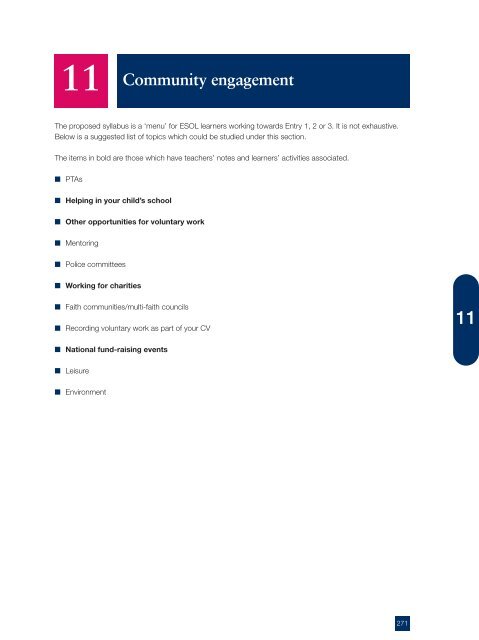
![NIACE Briefing Sheet2: What motivates people to learn [PDF]](https://img.yumpu.com/51410634/1/184x260/niace-briefing-sheet2-what-motivates-people-to-learn-pdf.jpg?quality=85)
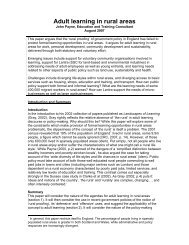
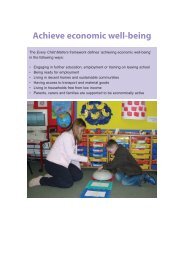
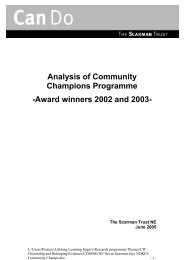
![Section 11: Volunteering and citizenship - [PDF File] - Niace](https://img.yumpu.com/49993701/1/190x255/section-11-volunteering-and-citizenship-pdf-file-niace.jpg?quality=85)

![credit card leaflet - [PDF] - Niace](https://img.yumpu.com/49256644/1/190x245/credit-card-leaflet-pdf-niace.jpg?quality=85)
![NIACE Briefing Sheet 11: Emancipatory Learning [PDF]](https://img.yumpu.com/48109261/1/184x260/niace-briefing-sheet-11-emancipatory-learning-pdf.jpg?quality=85)
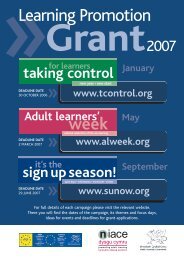
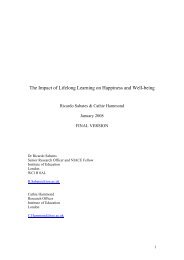
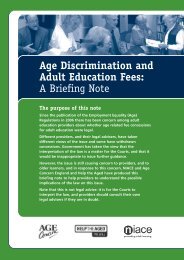
![Ice-breakers and other suggestions for your media club - [PDF] - Niace](https://img.yumpu.com/45206918/1/190x245/ice-breakers-and-other-suggestions-for-your-media-club-pdf-niace.jpg?quality=85)
